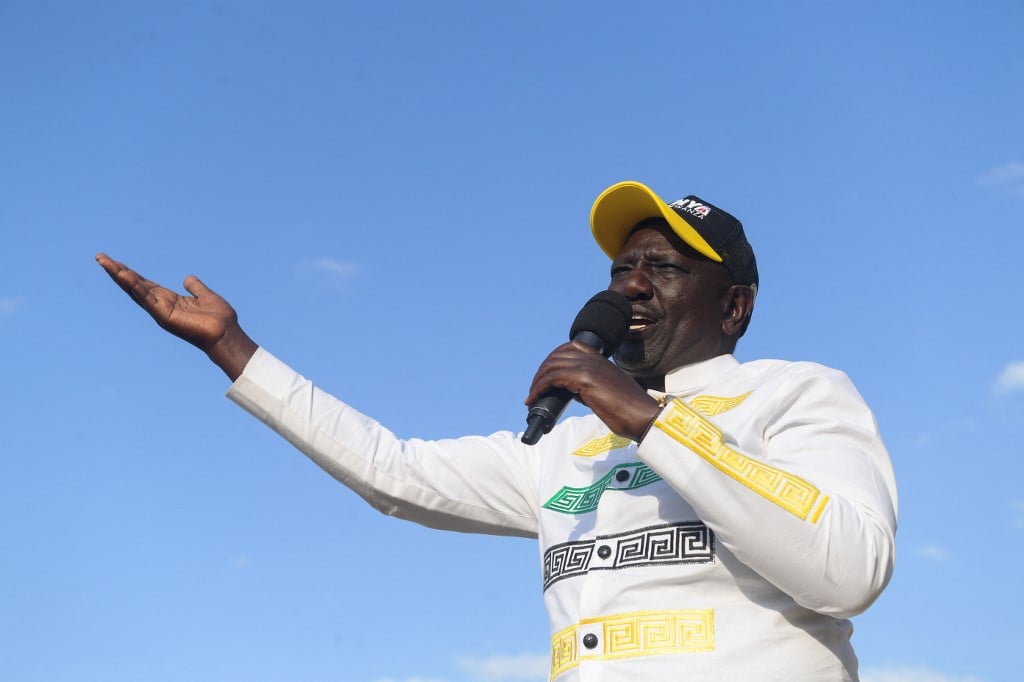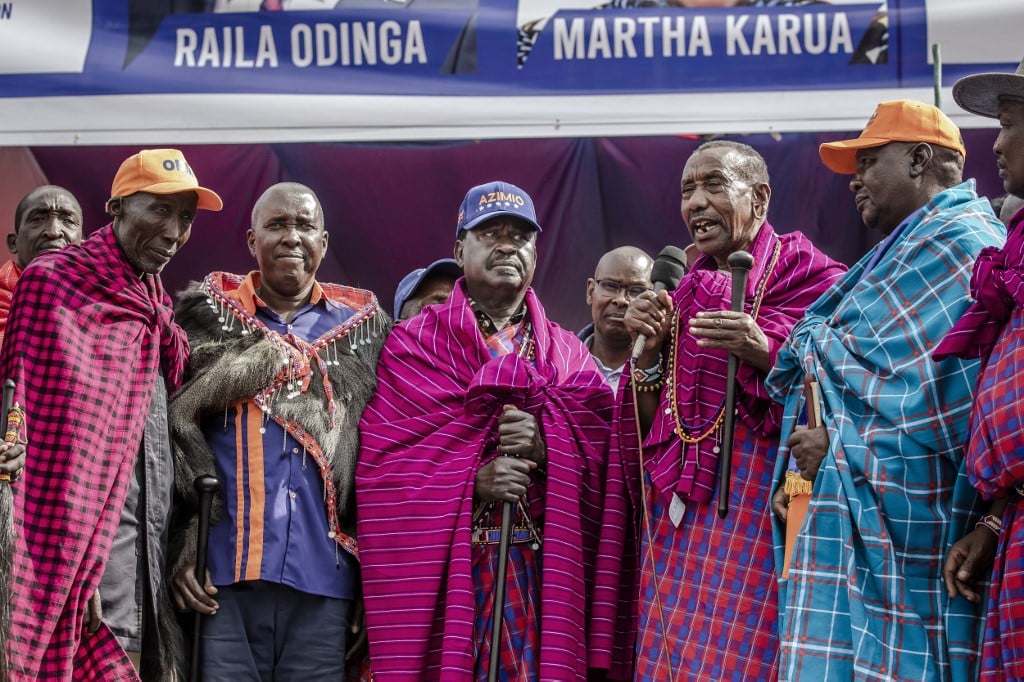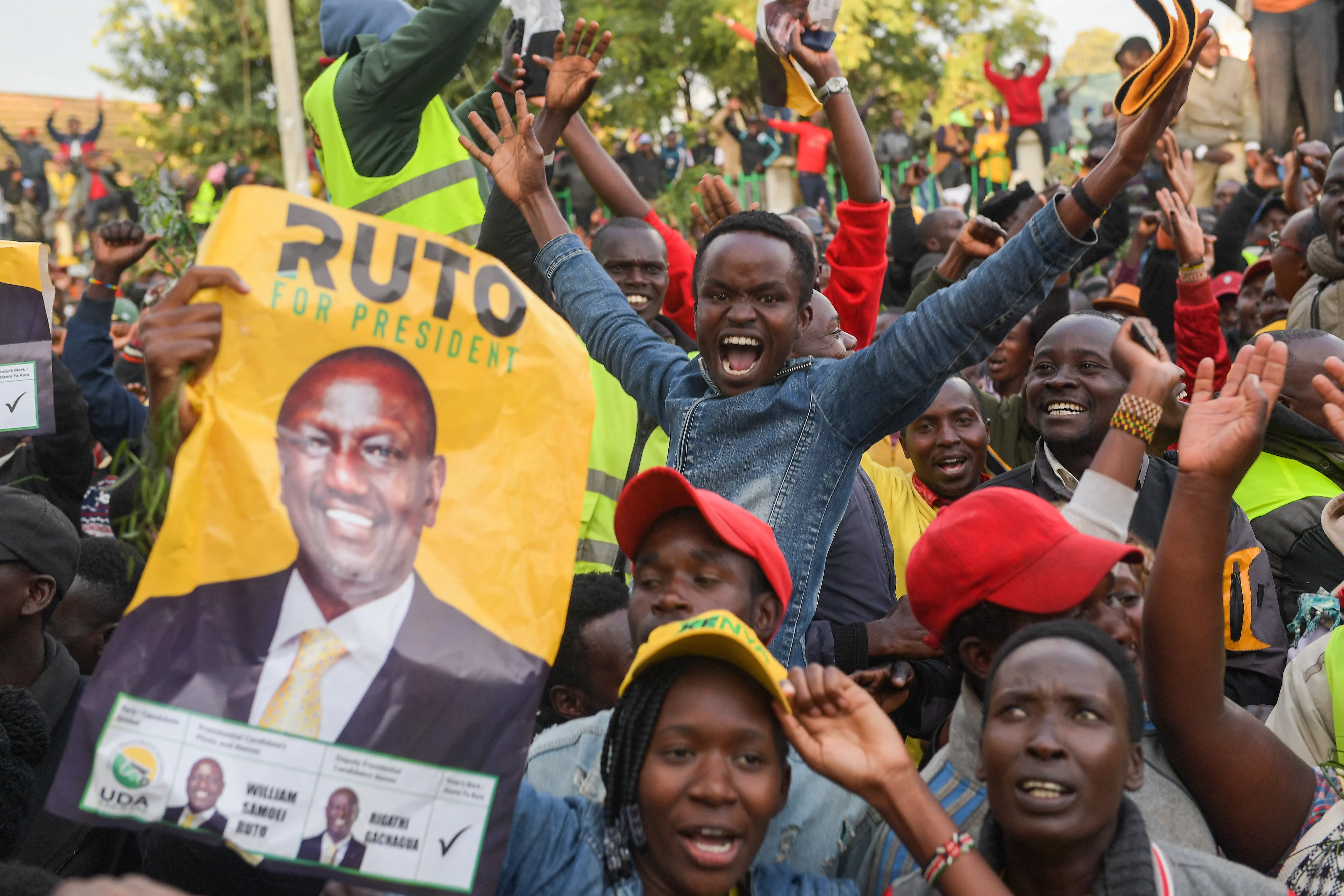Deputy president William Ruto has been named the winner of Kenya’s presidential election despite divisions in the electoral commission over the validity of the result.
The former live chicken seller – who has touted himself as a champion of the poor who will empower Kenya’s “hustler nation” – took 50.4% of the vote, and at least 25% in 39 counties, with a total of 7,176,141, said Wafula Chebukati, the chair of the Independent Electoral and Boundaries Commission (IEBC), who is empowered by electoral law to declare the winner.
Rival Raila Odinga gained 48.85% of the votes, a total of 6,942, 930, Chebukati said. Over 22m of registered voters cast their votes, around 56.17% of Kenya’s 54 million population.
However, moments before the results went live, four of the seven members of the IEBC disowned the results. The split nature of the IEBC decision makes a court challenge by Odinga likely, but a legal challenge must take place in the next seven days.
At a press conference at a Nairobi hotel, IEBC vice-chairman Juliana Cerera said:
“As you can see we are here and not at the Bomas due to the opaque nature of the way this [last] phase has been handled.
“We therefore cannot take ownership of the results to be announced,” she said, urging parties to go to court over the dispute.
Odinga did not attend the announcement event in Bomas.
Challenge likely
The results of the last presidential election in 2017 were annulled after the Supreme Court ruled that the electoral commission had not followed protocol on vote tallies. A similar legal challenge could spark tensions in areas heavily contested by the candidates, says Ben Hunter, Africa analyst at Verisk Maplecroft.
“A legal challenge would plunge the country into a period of political instability, it would also function as a pressure relief valve in that a Supreme Court petition would defuse social tensions while groups await the result.
“The police have not been significantly reformed since they killed dozens of protestors in 2017,” Hunter adds.
The national election headquarters beefed up riot police on Monday after skirmishes broke out between police, election officials and party agents over allegations of vote rigging.
William Ruto – champion of the “hustler nation”

Born in the Rift Valley, 55 year-old Ruto owns vast parcels of land and a chicken farm in his home village of Sugoi.
Ruto descends from the third biggest ethnic group, the Kalenjin, which has produced just one other president Daniel Moi, who served for 24 years.
The sharp-suited deputy president pledges to launch an annual $420m “hustler fund” which aims to provide credits at an affordable rate to 10m small and medium enterprises (SMEs).
“He has portrayed Odinga as elitist on the economy and spun plans to fund employment training programs as essential help for the every-day Kenyan,” says Verisk Maplecroft’s Ben Hunter.
Ruto claims to have worn his first pair of shoes at 15 years-old, having spent his early years barefoot.
Like many leading Kenyan politicians he has seamlessly shifted party alliances over the course of his political career. In 1992, Ruto joined the youth wing of the Kenya African National Union (KANU), which used to dominate the political system, and first entered parliament in 1997 at the age of 30. He went on to support his main opponent in this year’s election, Odinga, at the 2007 polls.
After falling out with his mentor, President Uhuru Kenyatta, Ruto was rejected by the Jubilee Party as its presidential candidate for the 2022 election, prompting him to join the United Democratic Alliance (UDA) last year and become the official candidate of the 12-party Kenya Kwanza coalition, of which the UDA is part.
Debt mountain
The new president faces an economy with rising debt challenges, job losses from the pandemic, and rising fuel and food prices.
Ruto has pledged to boost tax revenues to service the country’s almost $70bn debt and rules out a restructuring.
“I am not going anywhere near or even having a discussion on restructuring debt. We must pay our debt. We have the capacity to pay our debt… We will put the brakes on borrowing.”
He has launched plans to mobilise taxes through digitisation which he says will more than double VAT collection to 8% of GDP from 3.6%.
“We will have more resources to repay our debt and we will be borrowing less, which is a double gain.”
By contrast, Odinga promised to “restructure and reprofile” Kenya’s $68.8bn debt with creditors to make it sustainable and remove the need for future bailouts, a pledge which is at odds with Ruto’s plans to address debt by mobilising taxes.
Record-high inflation will quickly dent both candidate’s generous spending pledges, says Hunter.
“With over half of government spending going to service Kenya’s debt, another borrowing spree to try and offset prices simply isn’t sustainable.”
Kenya’s debt rose to $68.8bn in 2021, from just $37.7bn, or 34% of GDP, when current president Uhuru Kenyatta was re-elected in 2017.
Of that 63% of bilateral debt is owed to China – approximately $7bn – mainly for large-scale infrastructure projects such as the Nairobi Expressway, which cost $668m, according to the World Bank.
Opposition cries foul
Accusations of vote rigging and fake news surfaced late on Thursday as the chairman of Kenya’s governing Jubilee party claimed, without producing any proof, that the elections were rigged, fuelling public anxiety.
Meanwhile Twitter flagged tweets from leading Kenyan officials announcing winners of the race, warning users on the social media platform to fact-check the information as the Kenyan electoral authority “might not have called the election results when this was Tweeted”.
As the nation awaited the results of Tuesday’s election a top official from Odinga’s Azimio party, Saitabao Ole Kanchory, was ejected from the vote counting centre. He told Citizen TV:
“We have intelligence reports that their system was penetrated and hacked and that some of the IEBC officials actually committed electoral offences and some of them ought to have been arrested if they were not arrested.
Odinga – fifth time unlucky

Odinga’s defeat marks the fifth time he has contended and lost an election.
He campaigned on a platform to continue large-scale spending on infrastructure projects launched by his rival-turned-patron former President Uhuru Kenyatta, who reached his two-year term limit.
In 2017 the veteran opposition leader boycotted the election re-run leaving Kenyatta with an almost free reign over six minor candidates.
As Kenyatta’s anointed successor, Odinga of the Azimio La Umoja (Declaration of Unity) coalition party was seen as the continuity candidate.
As the son of Kenya’s first vice-president, Jaramogi Oginga Odinga, who served under Uhuru Kenyatta’s father, Jomo, Odinga is seen as a scion of an entrenched political dynasty.
Want to continue reading? Subscribe today.
You've read all your free articles for this month! Subscribe now to enjoy full access to our content.
Digital Monthly
£8.00 / month
Receive full unlimited access to our articles, opinions, podcasts and more.
Digital Yearly
£70.00 / year
Our best value offer - save £26 and gain access to all of our digital content for an entire year!
 Sign in with Google
Sign in with Google 



